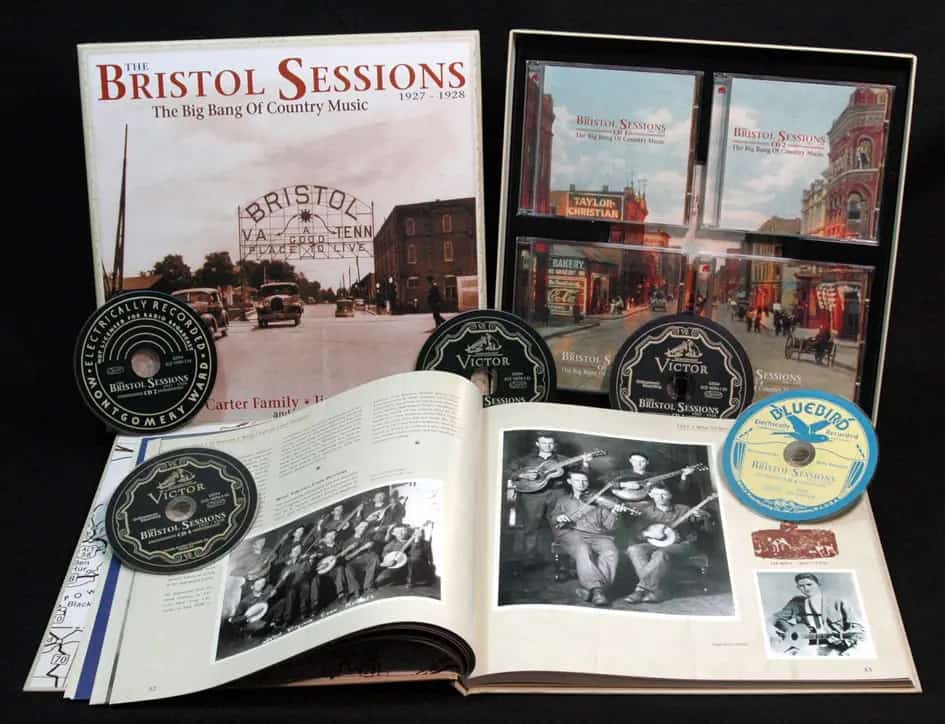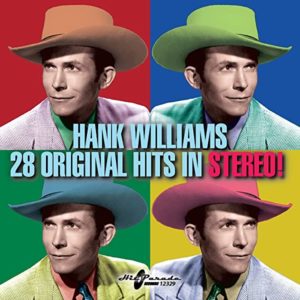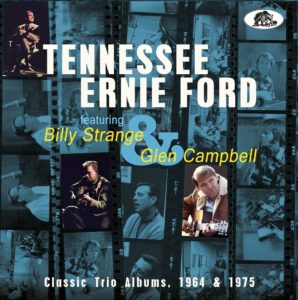In 1927, Ralph Peer of the American Victor Talking Machine Company (later RCA Victor) set up a makeshift recording studio on the second and third floors of the Taylor-Christian Hat Company building in Bristol, Tennessee, a twin city of Bristol, Virginia. From 25 July to 5 August, Peer recorded 76 performances by 19 different acts, including Ernest Stoneman, Henry Whitter and Blind Alfred Reed.
But it is mainly owing to two acts―The Carter Family (A.P., Sara and Maybelle) and Jimmie Rodgers― for which the sessions are remembered. So important were these acts that Nolan Porterfield, author of a Jimmie Rodgers biography, described the sessions as “The Big Bang of Country Music”, and the city of Bristol was recognized in 1998 by the United States Congress as the “Birthplace of Country Music”.
Both terms are somewhat misleading though. In cosmology, the “Big Bang” refers to a hypothesized creation of the Universe from a singularity of infinite density and temperature. Although other universes might have existed before the Big Bang, a contemporary theory holds that the Big Bang was the “starting” point for the current universe.
Stretching the analogy to country music, however, is fraught with difficulties, because recorded country music predated the 1927 Bristol sessions. In fact, Ernest Stoneman, who was present at the sessions, had made his first records in 1925 and Peer had earlier recorded a crusty old Georgian fiddler, “Fiddlin’ John Carson”, in Atlanta (not Bristol) in 1923.
It was Carson’s recordings that, arguably, triggered interest in “hillbilly” or “old-time” country music, even though Eck Robertson’s and Henry Gilliland’s recordings preceded Carson’s by about a year.
Nevertheless, the Carter Family and Jimmie Rodgers are important in the history of country music. Country music authority Jocelyn Neal wrote: “Rodgers, the Carters, and even Peer deserve some credit for … setting expectations regarding the genre’s musical contents.” Peer’s contribution, she said, “was largely his emphasis on vocal music, which he preferred for business reasons—it was easier to copyright and sell music with words.”
Rodgers was an initial inductee into Nashville’s Country Music Hall of Fame in 1961 and was given the title “the father of country music” (even though the term “country music” wasn’t used during his lifetime to describe his recordings); and the Carter Family went on to record some 300 songs which have been described as having a profound impact on country music, Bluegrass, Southern gospel music and folk music.
Ernest Stoneman, the Carters and Ralph Peer were also inducted into the Country Music Hall of Fame in 2008, 1970 and 1964, respectively.
The Bristol sessions have been described in detail in “The Bristol Sessions: Writings about the Big Bang of Country Music”, edited by the late Charles Wolfe and Ted Olson in 2005 (still available from US Amazon). Six years later, Olson and Tony Russell produced the monster Bear Family 5-CD set “The Bristol Sessions 1927-1928: The Big Bang of Country Music” (BCD 16094 EK).
The set is currently available from Bear Family and Amazon (Australia). It highlights the eclectic mix of performers Peer recorded―gospel groups, string bands, banjo players, fiddlers, family groups, singing guitarists, and others. If you have the money and the interest, this is the set to go for. It has all the recordings (including those from later 1928 sessions) mastered to Bear’s uncompromising standards, accompanied by a 120-page hard-cover book with full notes and a discography. The set was nominated for the 54th Grammy Awards for “best historical album” and “best album notes”.
In 2020, Bear Family released a single CD of the 1927 and 1928 sessions, “We Shall All Be Reunited: Revisiting the Bristol Sessions 1927-1928” (BCD17592), produced by Ted Olson (Professor of Appalachian Studies, and Bluegrass, Old-Time and Country Music Studies at East Tennessee State University). Olson also penned the text to the accompanying booklet, placing the Bristol sessions in an historical context.
“We Should All Be Reunited” refers to a song recorded by Alfred G. Karnes in 1928 (not to be confused with a Patty Griffin album of the same name). The 26-track CD is available from Bear Family and Amazon Australia. It comprises an eclectic mix of artists with one track each by the Carter Family (“The Poor Orphan Child”) and Jimmie Rodgers (“Sleep Baby Sleep”). As is usual with Bear Family CDs, the mastering is first rate and there are comprehensive and informative notes.
Bear Family have also released other box sets that are related to the Bristol sessions, including a 6CD set of Jimmie Rodgers (BCD15540, unfortunately now deleted ), a 12-CD Carter Family set (BCD15865), and two other “session” sets, both compiled and annotated by Tony Russell and Ted Olson: The Johnson City Sessions (BCD16083) and The Knoxville Sessions (BCD16097).
All highly recommended.





